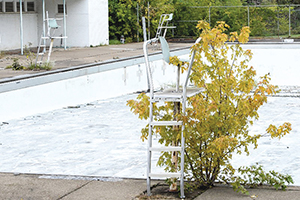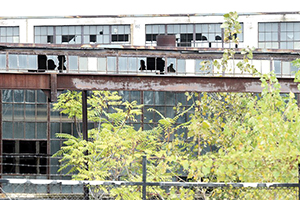
Photo by Michael Balash/© CHA
Chris Smith wants a supermarket for her neighborhood.
That should be a reasonable request for a quadrant of Canton, Ohio, a city of 78,000 residents with about three dozen general and specialty grocery stores. None of them is in Ward 4, the southeast neighborhood that Smith has represented on the city council since 2008.
What the southeast neighborhood has in abundance are challenges — poverty, crime, vacant buildings and lots, the city's highest rate of infant mortality, and most of its public housing. Residents who can't drive or take buses to supermarkets elsewhere must be content with the offerings of a convenience store, which does not carry fresh food.
"This used to be a lively area, with an A&P and drugstores and lots of families everywhere," said Smith, 63. "But it's been forgotten. We still have people who live here. There has got to be a brighter way."
Smith sees hope for change in a $60,000 planning grant from two major national philanthropies, the Robert Wood Johnson Foundation and the Reinvestment Fund, the latter a private funding agency that assists communities in improving health and living conditions. Canton is one of 50 midsized cities that received grants in May.
The program is called Invest Health. With it, the Robert Wood Johnson Foundation and the Reinvestment Fund hope to transform the way leaders of midsized American cities approach improvement and redevelopment projects in low-income areas. Special attention is being given to things that drive population health, including safe and affordable housing, places to play and exercise, and quality jobs.

Mercy Medical Center is the anchor institution for the Canton initiative. Also participating are the city government, the school district, the Stark County Community Action Agency and the Stark Community Foundation, a local philanthropy. Each appoints representatives to a sponsoring team, which includes Elaine M. Campbell, director of the Mercy Development Foundation. The team is overseeing research and public hearings to develop a plan for the southeast neighborhood.
Said Smith, "We have to have hope. I believe this is our time."
At a community hearing on Aug. 11, about 40 residents, community leaders and businesspeople discussed the need for better housing, education and access to healthy food choices. The 90-minute session at the neighborhood community center was the first of three to be held as part of the Invest Health project. The meetings are structured to encourage residents to speak freely.
Canton, about 60 miles south of Cleveland, is an industrial city in the heart of the nation's Rust Belt. It is perhaps best known nationally as the birthplace of professional football, symbolized by the Pro Football Hall of Fame northwest of downtown. The hall is near Mercy Medical Center. The city's two major retail centers are farther to the north, following development patterns.
The southeast neighborhood, home to about 12,000 residents, includes three clusters of public housing. A highway built in the 1950s split the neighborhood in half. The A&P and the drugstores closed.

Campbell said the grant is intended to spur community collaboration to plan and execute specific improvements for southeast Canton, such as Smith's dream for a new supermarket. She said the grant paid for a conference that team members attended in Philadelphia and part of the salary of a research specialist at the Stark foundation, who is coordinating the public hearings and data collection.
The team works with staff members of the Reinvestment Fund and the Robert Wood Johnson Foundation. The grant period is for 18 months, with prospects for future assistance on specific projects.
"Our task is to bring people together, gain the trust of the neighborhood, establish a vision and carry it out," said Campbell. "This will be a slow, steady process. There have been grants and programs in the past. We believe collaboration can bring results."
Campbell said participation by Mercy Medical Center "dovetails perfectly with our mission of offering compassionate health care for all."
There's nothing new about urban decline — or high-minded ideas for redevelopment. Canton Mayor Thomas Bernabei said Invest Health offers "a high probability of success" because it is an organized planning process for including all stakeholders, from residents to philanthropies. Bernabei also said there is clarity in the first major step: "To work with the community to identify and plan one project for the future."
He said that goal may become a new grocery store, which he regards as a worthy but daunting challenge because of generally low profit margins in food retailing. Bernabei said the Invest Health project, with its assistance from the two national sponsors, "can identify specific sources of funding and support to assist with the development of a grocery store.
"It is something that is at the forefront of our conversations," he said.

Ohio's economically challenged Ward 4.
Photo by Michael Balash/© CHA
Campbell said another product of Invest Health could be development of a health clinic for the southeast neighborhood. In 2012, the hospital opened a satellite health center, Mercy Medical Center at St. Paul Square, in northeast Canton to provide medical, behavioral and dental health services.
Campbell said Mercy Medical Center has worked on other projects with the Robert Wood Johnson Foundation, which recognized the hospital in 2013 as a "point of promise" for Mercy's care to underserved communities through the St. Paul Square clinic.
She said Smith's call for a supermarket also fits within the program's definition of health care. "Today, people in southeast can buy alcohol, cigarettes and processed food. Nothing fresh," she said. "One of our efforts will be showing people how to best prepare fresh vegetables."
The Canton program, announced in May, also calls for improvements in housing; job training for adults and an enhanced kindergarten program that promotes healthy habits, medical and dental care, and immunizations.
Dr. Donald Schwarz, a vice president of the Robert Wood Johnson Foundation in Princeton, N.J., said the Invest Health grants are intended to bring community leaders together to improve distressed neighborhoods.
"Public officials, community developers and many others have been working in low-income neighborhoods for years, but they haven't always worked together," Schwarz said. "Invest Health aims to align their work and help neighborhoods thrive by intentionally incorporating health into community development."
